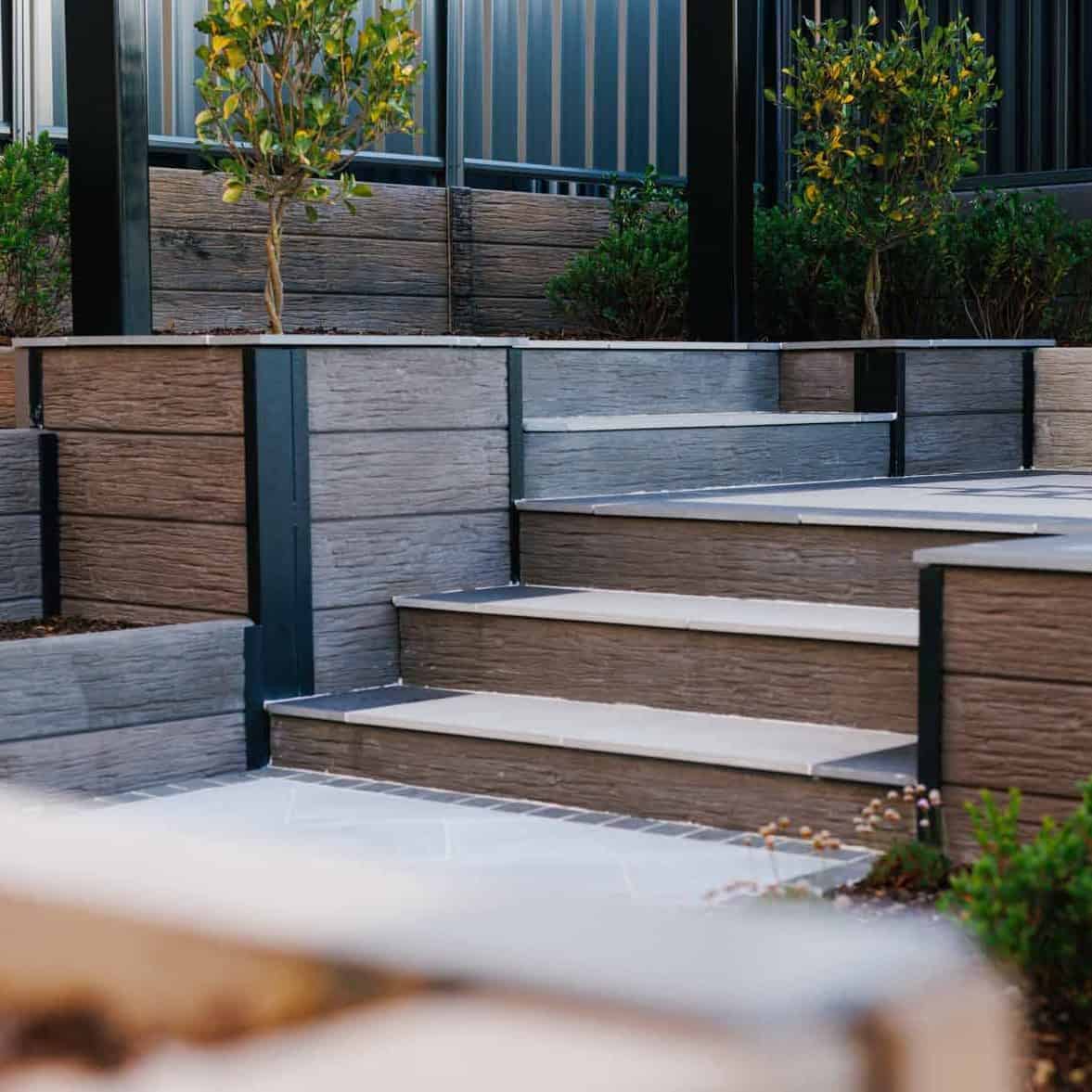Just like a chameleon adapts to its surroundings, concrete sleepers can blend into your outdoor space with an aesthetic versatility that’s hard to match. They’re not just for the railway anymore; you can use them in a variety of creative ways that might surprise you.
From landscaping to outdoor furniture, these sturdy blocks offer a unique mix of functionality and design. But how exactly can you repurpose these industrial items into something beautiful and utilitarian for your outdoor spaces?

Let’s explore this intriguing topic together and uncover the true potential of concrete sleepers in sydney.
Defining Concrete Sleepers
You might be wondering, ‘What are concrete sleepers?’ Well, they’re simply rectangular blocks of concrete used in outdoor spaces like gardens and railroads for various purposes. They’re quite heavy-duty and can withstand all sorts of weather conditions, making them a handy, durable choice for many outdoor projects.
You’d typically find them in railway tracks, acting as a base for rails. Their robustness ensures they don’t shift under the weight and movement of passing trains. But it’s not just railroads that benefit from these sturdy blocks. They’re also widely used in landscaping and construction.
In gardens, they can be used to create raised beds, retaining walls or even steps. Their uniform size and shape make them easy to stack and arrange, and their durability means they’ll last for years without needing much maintenance. Plus, they’ve a certain rustic charm that can add a unique aesthetic to your outdoor space.
Versatility of Concrete Sleepers
Concrete sleepers’ versatility is what truly sets them apart, serving not only functional purposes but also enhancing the aesthetics of any outdoor space they’re incorporated into. These multi-purpose elements can transform your outdoor area into a sanctuary that’s not just practical but also appealing to the eye.
Here are four ways that concrete sleepers can add value and beauty to your outdoor spaces:
- Garden Beds: You can use concrete sleepers to create raised garden beds. They’re sturdy and can withstand harsh weather conditions, making them perfect for year-round gardening.
- Retaining Walls: Concrete sleepers can be used to build robust retaining walls. These can help control soil erosion, manage water runoff, and add a level of sophistication to your landscape.
- Seating: Believe it or not, concrete sleepers can be turned into outdoor seating. Add some cushions and you’ve got a unique, rustic outdoor lounge area.
- Walkways: Concrete sleepers can be laid flat to create interesting, durable walkways. This can provide a safe path through your garden and add visual interest to your outdoor space.
Concrete Sleepers in Landscape Design
Building on their versatility, let’s explore how incorporating concrete sleepers into your landscape design can further enhance the aesthetic and functional aspects of your outdoor space.
Concrete sleepers aren’t just for railway use, they’re perfect for creating a modern, industrial look in your garden. Use them as edging for a sleek, minimalist effect. They’re sturdy enough to keep plants contained, but their neutral gray color won’t overshadow your beautiful blooms.
You can also use concrete sleepers to build raised garden beds. They’ll provide excellent drainage and create a unique tiered effect. Plus, you won’t have to worry about them rotting like wooden sleepers.
Ever thought of using concrete sleepers to construct steps or a retaining wall? They’re great for both! Not only will they add a striking visual element, but they’ll also provide a safe, sturdy structure that’ll stand the test of time.
Concrete Sleepers as Outdoor Furniture
Shifting gears, let’s consider how concrete sleepers can be repurposed into stylish and durable outdoor furniture. You might be skeptical about the idea, but you’d be surprised by the modern, industrial appeal they can bring to your garden or patio. Plus, they’re weatherproof, requiring little maintenance.
Here are four creative ideas:
- Bench: You can stack sleepers horizontally or vertically to form a robust bench. Top it with plush cushions for comfort.
- Coffee Table: A horizontal stack of sleepers secured together can serve as a unique coffee table. Ensure to smooth the top surface for safety.
- Plant Stand: Single sleepers can act as sturdy plant stands. They can add height and interest to your outdoor plant display.
- Outdoor Bar: This might require a bit more handiwork, but a bar made from concrete sleepers is sure to impress your guests.
Upcycling Old Concrete Sleepers
While you might think old concrete sleepers are destined for the landfill, there’s a host of creative ways you can upcycle them into functional and stylish pieces for your outdoor spaces. These hardy materials can be transformed into garden benches, flowerbed borders, retaining walls, or even stepping stones.
Start by giving them a thorough clean. A high-pressure washer will strip off any old paint and grime. Then, let your imagination run wild. You can paint them in vibrant colors to jazz up your garden or keep them in their natural gray for a minimalist look.
If you’re going for a rustic vibe, why not create a charming pathway with them? Lay the sleepers flat and fill the gaps with pebbles or gravel. For a more modern appeal, stack them to make a robust outdoor table or bench.
Don’t forget, you can also cut them into smaller pieces for unique planters or bookends. It’s all about utilizing what you’ve got and turning it into something extraordinary.
Maintenance and Durability Factors
Now that you’ve breathed new life into those old concrete sleepers, let’s talk about how to maintain their durability for long-lasting use in your outdoor space.
- Cleaning: Regular cleaning is essential. You can use a pressure washer or a stiff brush with a mixture of warm water and a mild detergent. This routine helps to prevent the buildup of dirt, algae, or moss that can degrade the concrete over time.
- Sealing: To protect the concrete sleepers from weather elements, consider applying a concrete sealer. It acts as a protective layer against rain, sun, and temperature changes.
- Inspection: It’s important to regularly check your concrete sleepers for signs of wear or damage. Look out for cracks or chips. If you find any, repair them as soon as possible to prevent further deterioration.
- Placement: Ensure your sleepers are correctly placed. They should be on a stable and well-drained surface to avoid water accumulation, which can lead to rot and damage.
Frequently Asked Questions
What Is the Cost Comparison Between Concrete Sleepers and Other Types of Outdoor Materials?
When comparing costs, you’ll find concrete sleepers are typically more affordable than other outdoor materials. They’re durable, require less maintenance, and won’t rot or warp, saving you money in the long run.
Are There Any Safety Concerns When Using Concrete Sleepers in Outdoor Spaces?
You might worry about safety with concrete sleepers outdoors. However, they’re incredibly stable and durable. There’s no risk of splinters or rotting like with wood, making them a safe choice for your outdoor spaces.
Can Concrete Sleepers Be Painted or Decorated for Aesthetic Appeal?
Absolutely, you can paint or decorate concrete sleepers to enhance their aesthetic appeal. They’re like blank canvases, ready for your creativity. Just be sure to use weather-resistant paint or decorations to withstand outdoor conditions.
How Are Concrete Sleepers Installed in an Outdoor Space?
Installing concrete sleepers is like building a puzzle. You’ll dig a trench, lay a gravel base, and then arrange the sleepers. They’re leveled and secured with soil or concrete. It’s a simple, yet effective process.
Can Concrete Sleepers Be Used in Indoor Design as Well?
Absolutely, you can use concrete sleepers indoors! They’re not just for outdoor spaces. They make great accent walls, unique shelving, or even stylish room dividers. Just let your imagination run wild with this versatile material.
Conclusion
So, you’ve discovered the versatility of concrete sleepers. They’re not just for railways anymore, right?
Imagine these durable blocks as landscape design elements or even outdoor furniture.
Picture upcycling old ones for a touch of rustic charm.
Remember, they’re low-maintenance and built to last.
What a beautiful contrast – the rugged concrete sleepers in your soft, green garden.
So, go ahead, let your creativity run wild and add some industrial chic to your outdoor space with concrete sleepers.

